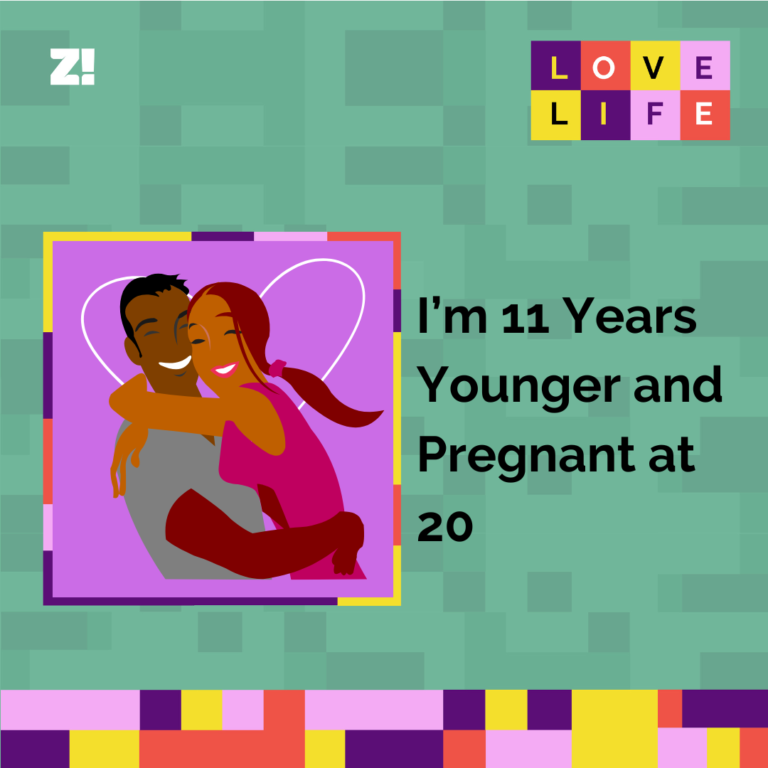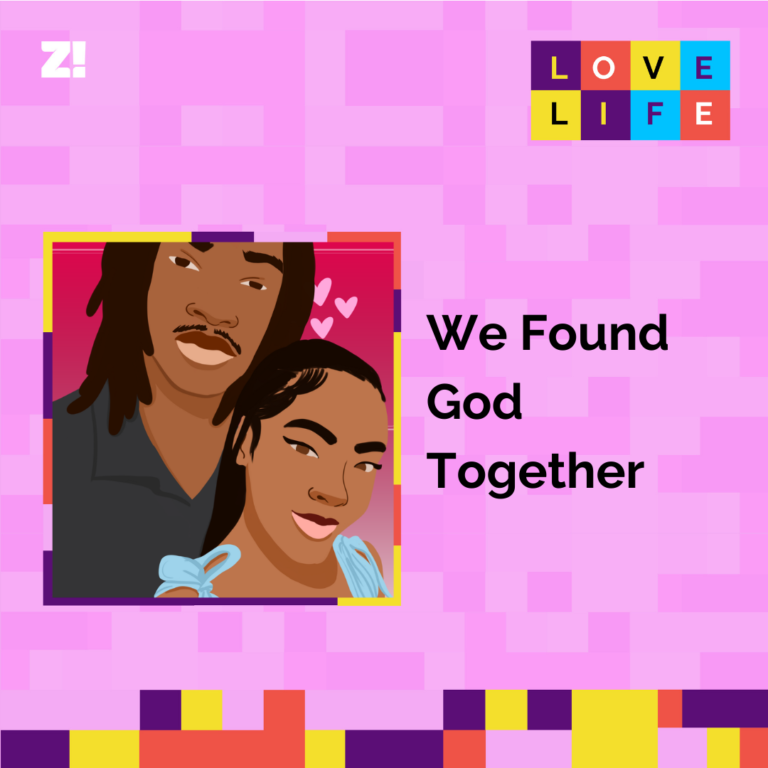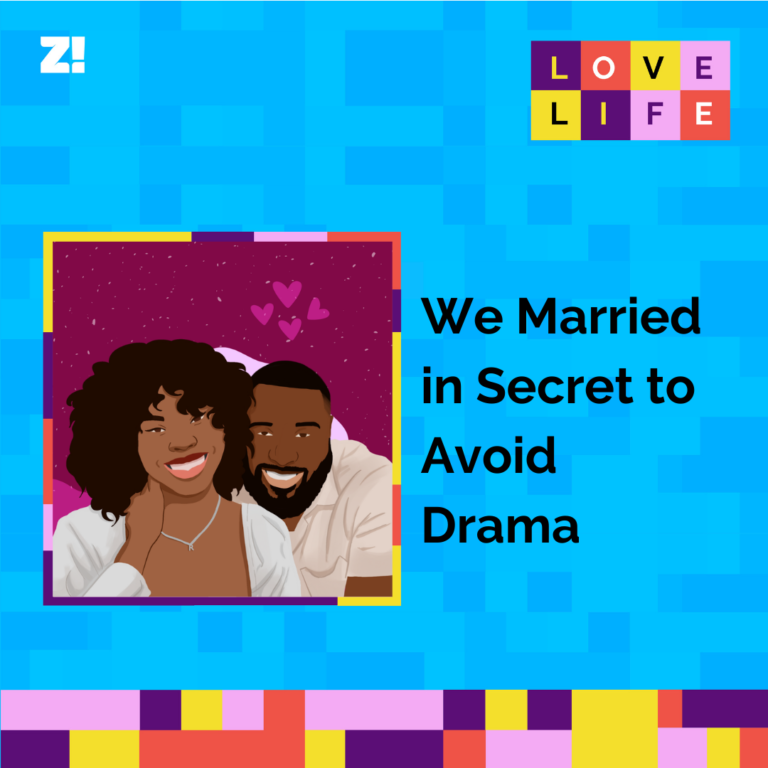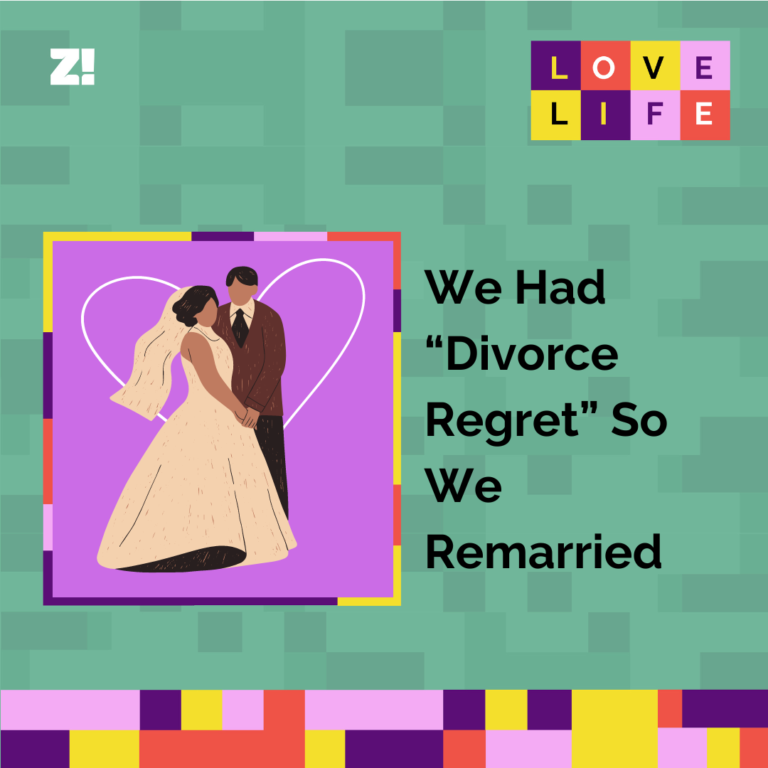Love Life is a Zikoko weekly series about love, relationships, situationships, entanglements and everything in between.
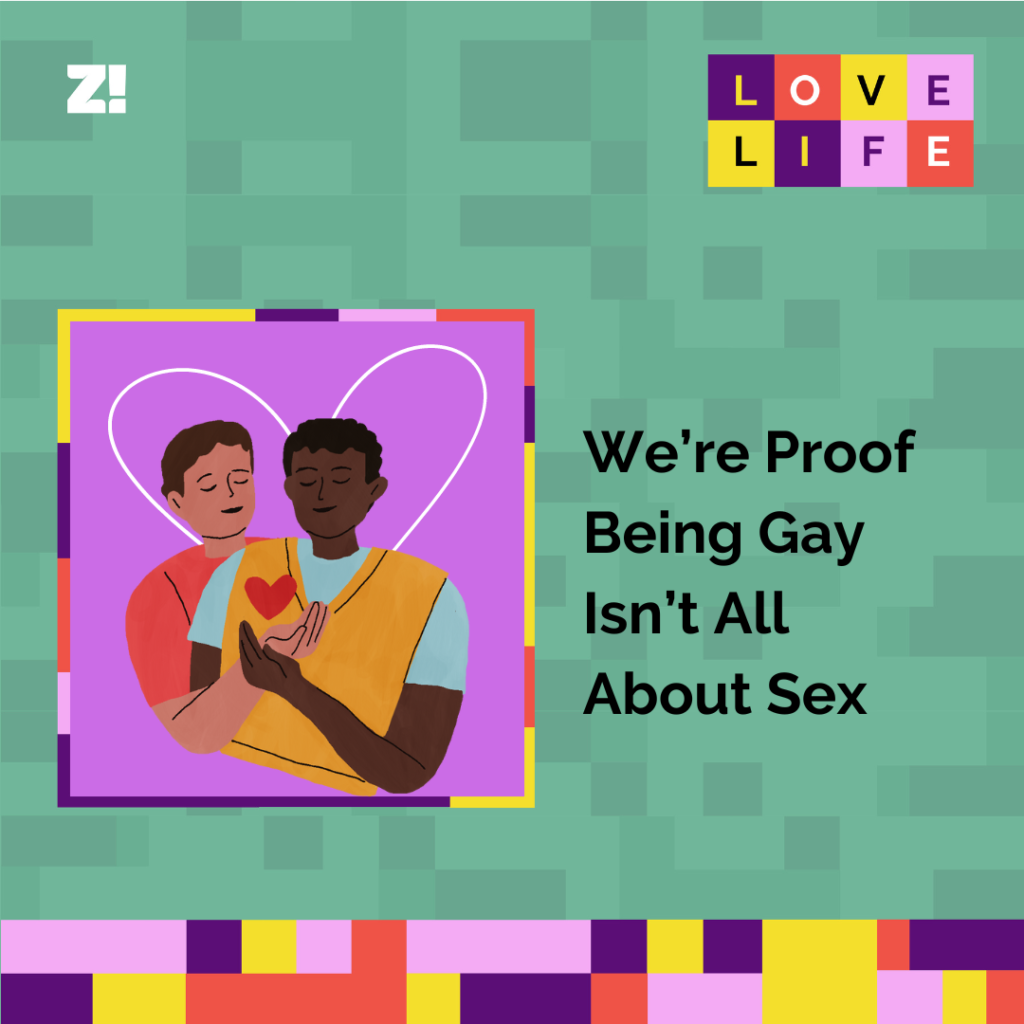
What’s your earliest memory of each other?
Peter: It was my first day at my first job post-NYSC in 2017. He started some months before me, but we were both fresh out of university. I’d heard horror stories about working in Lagos, so I was already bracing myself for the worst.
Ayo walked in that morning all self-assured. He ended up being assigned as my mentor during orientation, and I was struck by how easy it was to talk to him. It wasn’t just small talk; we had a real conversation about our hopes, fears and what we wanted out of life, on that first day.
Ayo: My earliest memory of him is his laugh. It was the first thing that stood out to me—how he could be so nervous yet still find something to laugh about. We were in this awkward team-building exercise some days into the orientation, where everyone was supposed to share something unique about themselves.
Most people said the usual things, but Peter blurted out that he was obsessed with old-school cartoons. Everyone laughed; there was something about the way he made people feel at ease, like he was always trying to make the world a little less serious. I think that’s when I knew I wanted to be around him more.
Did you tell each other how you felt right away?
Peter: Oh, definitely not. It took a long time for us to get there. I didn’t even realise I liked him in that way at first.
We became friends. We’d go to work together, have lunch together, hang out on weekends. People would joke that we were like an old married couple, but I brushed it off as just that—a joke.
Ayo: No, it wasn’t immediate at all. I had my guard up for a long time because of past experiences. I’d been with a few guys before, and none of those ended well.
When I met Peter, our connection was deep from the start. But I didn’t want to mess it up by rushing things or assuming he felt the same way. I mean, I didn’t even know if he was queer or not. And in Nigeria, you have to be so careful. Even if someone is your best friend, you can never be too sure how they’ll react to you being gay.
Peter: Plus, I’d never been in a relationship before, so I didn’t even know what it felt like to like someone. It was only after a few years, when I started feeling a pang of jealousy whenever Ayo talked about dating someone else, that I began to understand my feelings.
What was the specific turning point?
Ayo: We had this one night when we just sat in my room talking about everything and nothing, and I felt like I had to say something. I could just sense that he felt the same way, but neither of us wanted to make the first move. It was almost like we were waiting for the other person to give a sign.
It just slipped out awkwardly. I told him I loved him. And it was such a relief when I did because he said it back. We just sat there, both a little stunned by the reality of what we’d admitted to each other.
Peter: He’s forgetting to add that this was over two years after we met.
What happened within the span of those years?
Ayo: Again, we were really good friends—who happened to spend almost all our time together.
Peter: We’d go for things like short film screenings and art exhibitions; things that none of our other friends particularly found fun. I think the bond solidified over us loving the same niche things, like manga and long walks.
I’d always wanted to be involved in running marathons. And I never would’ve if I didn’t have someone like him, who was just as interested, to motivate me.
How did the relationship evolve after?
Peter: Things became… complicated.
We didn’t just jump into a relationship. We were still figuring out what this meant for us for some time. It’s one thing to admit your feelings; it’s another thing entirely to navigate those feelings in a place like Nigeria. So, we kind of tiptoed around it for a while. We continued being friends, but with this new layer of understanding between us.
Ayo: It was a weird transition.
We didn’t go on dates. We created our own version of dating—a lot of nights in, eating my mum’s dinner together in my small room, watching movies, just being in each other’s company. We’d eat together during lunch breaks too, and while it looked like two colleagues hanging out, there was this new, unspoken bond between us.
But there was also this tension, because we were constantly looking over our shoulders, worried someone might catch on.
Sounds tedious
Ayo: It wasn’t until a few months later that we had our first real date outside our homes. We went to this small, quiet restaurant where no one knew us. We sat in the corner, hardly touching, just talking. But for us, that felt like the most rebellious thing we could do—just sit there, in public, as a couple.
But Ayo, you’ve been in relationships with other men. Was this how those went too?
Ayo: They weren’t even real relationships, now that I think about it. They were more like flings, mostly physical. I was younger then, and I didn’t really understand what I wanted or needed from a partner. I just knew I was attracted to men. And to be honest, those relationships were toxic.
With Peter, it’s never been about sex—it’s about the way we understand each other.
Peter: We didn’t even know we were both asexual until much later, which probably explains why his other relationships never worked.
Ayo: It’s about having someone who truly gets you, who makes you feel safe in a world that constantly tells you you’re wrong for being who you are. So yeah, while we’re always careful, it’s the first time I’ve felt like I’m in a relationship that isn’t defined by sex or secrecy but by love, respect, and this deep, almost spiritual connection.
Do you have support systems?
Peter: That’s tricky. Besides each other, it’s really limited.
We can’t talk to our families about it—they’re either too religious, too traditional, or just outright homophobic. Most of our friends don’t even know we’re together; they just think we’re really close friends who spend a lot of time together. There are a couple of people we’ve confided in, but it’s always a gamble.
Ayo: Yeah, it’s tough. We don’t have the luxury of a typical support system. There’s no one to run to when things get hard, no family dinners where we can just be ourselves. My past experiences have made me even more cautious. I’ve been outed before by someone I thought I could trust, and it was a nightmare.
That’s why we’re so careful now.
You must have some friends close enough to know by now…
Peter: We stick to small, private groups where we can share our experiences with other queer people, both in Nigeria and abroad.
There’s this added pressure to stay under the radar, especially with how dangerous society is these days. We avoid PDA, even the smallest things like holding hands or sitting too close together. It’s exhausting, but we’ve learnt to navigate it. We have our own little code words and signals for when we’re out in public.
Ayo: Actually, the isolation is the hardest part.
Most times, it feels like we’re the only two people in the world who understand what we’re going through. And sometimes, that pressure gets to us. We’ve had arguments about it—about how much we can or can’t say to certain people, about whether it’s worth the risk to confide in someone new.
How do you navigate that constant fear?
Peter: We just keep going. The same way we all navigate the fear of dollar crashing and ruining your business, or you or your family getting kidnapped, or random fuel scarcity, inflation—everything else that’s wrong with this country.
Ayo: We’ve thought about leaving Nigeria, moving somewhere we can just be ourselves without fear, but it’s not that simple. Leaving would mean starting over from scratch. There’s this weird sense of attachment to this place, even with all its flaws. It’s home, you know?
Peter: That being said, I wish there were more queer resources available. It would make a world of difference to have access to counselling, safe spaces, or even just more understanding friends and family. But until that day comes, we’re our own support system, and we’ve learnt to be okay with that.
But do you plan to just never tell your family about each other?
Peter: Are you sure you’re a Nigerian with Nigerian parents?
If I’m being honest, the thought of telling my family terrifies me. They’re very religious—church every Sunday, prayer meetings during the week, that kind of thing. I know exactly how they’d react if I came out to them. It wouldn’t be just disappointment; it would be outright rejection. They’d probably try to “fix” me, take me to some pastor for deliverance or something like that.
And if that didn’t work, I’d be cut off. No contact, no support, nothing.
Ayo: I’ve gone back and forth on this a lot. Then reality hits, and I remember who my family is. My parents aren’t even religious like that, but they have zero tolerance for anything outside the norm. I remember when one of my cousins was rumoured to be gay about a decade ago; they cut him off completely. And he wasn’t even gay.
Wild
Peter: It’s not just about me, either. I’m the firstborn, and I have younger siblings. If I come out, it would affect them too. My parents might see it as some sort of failure on their part and take it out on them. I can’t do that to them. So I’ve made peace with the fact that my family may never know.
Maybe one day, I might reconsider. But for now, it’s just not worth the risk.
Ayo: I don’t think I ever will. My parents keep asking when I’ll settle down with a nice girl, start a family. I usually just laugh it off or change the subject.
It’s a painful situation to be in, and it sucks that we even have to think like this. I wish things were different. I wish I could introduce Peter to my family, let them see how much he means to me. But I know that’s not the reality we live in. It’s not ideal, but it’s the only way we can maintain some semblance of peace in our lives.
The friends who do know about this, how did they react?
Peter: They’re exhausting, to be honest. Even the ones in the queer communities we’ve joined over time, you’d think they’d know better. The constant questions about who’s the masculine and who’s the feminine partner are probably the most frustrating.
Ayo and I are both masculine, and that doesn’t fit the stereotype. People look at us and assume one of us must play a certain role or that we’re not being “authentic” to their idea of what a queer relationship should look like.
Ayo: A lot of it comes from ignorance. People don’t know what they don’t know, and we’re often faced with having to educate them, which can be draining. When people ask who’s the masculine and who’s the feminine partner, it feels like they’re not just questioning our roles in the relationship, but our entire legitimacy.
Or the ones who assume men are only gay because of the sex.
Really?
Ayo: Yes, and it’s hurtful.
People have this ingrained idea that sex is a crucial part of men “become” gay, so when they find out it’s not part of ours, they call us liars or think we’re crazy. It just makes us more determined to live our truth and show our love is valid, no matter what anyone thinks.
Does that mean you don’t have sex at all?
Peter: Yes, that’s right.
When we first got together, we both realised we were on the same page about it. For us, intimacy is more about emotional connection, trust and companionship. It doesn’t mean we don’t have a deep, intimate relationship—it just means that sex isn’t a part of it. We’ve never felt pressured to include it because it’s just not something either of us craves.
Ayo: Our first kiss was so awkward, and I was terrified. We wondered if something was wrong or if we should be doing something different. But once we understood ourselves better, it was a huge relief. We love to hug and cuddle and just feel each other’s warmth. But that’s where it ends.
Can we unpack the part where people assume sex is the main reason why people are queer?
Ayo: I don’t know if it’s just me, but I’ve noticed that people can’t fathom that a same-sex relationship can be about more than just sex. They see two men in a relationship, and immediately jump to conclusions that it can never be that deep.
Peter: When we finally share that we’re both asexual, people are shocked. Even other queer people. We’ve had to deal with a lot of unprovoked questioning.
Interesting. Any plans for the future?
Peter: Moving in together seems like the most natural thing to do, especially after five years together. But for us, it’s complicated. Living together as two men who aren’t related would raise too many eyebrows, especially in the kind of neighbourhoods we can afford to live in. People are nosy, and they talk.
My family, for example, would want to know why I’m living with another man instead of getting married and starting a family. They’d probably show up unannounced, and that’s not a risk we can take.
Ayo: But we always spend more time at my place.
The plan is to move to Abuja together once my rent is due in February—away from everyone we both know. We’ve started looking for jobs there, so fingers crossed. Neither of us particularly wants kids; we’ll just grow old together living our private lives.
Why don’t you want kids?
Ayo: No big reason. It’s just too complicated for us to plan towards right now.
What was your first major fight about?
Peter: Some months after we decided to date, weeks before we’d even convinced ourselves to go on an outside date, Ayo invited a friend over to his place while I was there, without giving me a heads-up.
I felt uncomfortable because I’d never met this friend before and wasn’t sure how I would be perceived. I’m someone who values having a bit of notice before having new people come into my personal space, especially since we were still figuring out our relationship.
Ayo: I honestly thought he was overreacting and being too reserved. It was like he didn’t trust me and judgement—and in my own father’s house again? But now, I know it was more about him needing to feel comfortable and secure in our shared spaces.
How did this turn into a fight?
Peter: We ended up having a long conversation about it after the guy left, and it was very heated. We both felt hurt and misunderstood, and it took a while for us to really listen to each other’s perspectives.
Ayo: I don’t know why but I felt judged for my choice of friends. I felt like he wasn’t giving me the flexibility to make decisions about my own space.
His reaction also felt too different from his usual way of laughing things off and taking nothing seriously. But after I calmed down and gave him small silent treatment, I realised he was just scared. He’d just come out to himself, whereas I’d known I was queer much longer than him.
I still didn’t apologise sha.
On a scale of 1 to 10, how would you rate your Love Life?
Peter: 7. I can’t wait for us to move in together so the rating can go higher.
Ayo: Yes. Probably a 7.
ANOTHER ONE: I Fell in Love With My Childhood Friend

